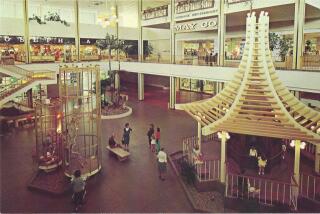DeBartolo--He’s a Hard-Nosed Workaholic With a Volatile Temper
- Share via
NEW YORK — Edward J. DeBartolo, the multimillionaire shopping mall developer who agreed to rescue Allied Stores from a hostile takeover bid, is reputed to be a combative and hard-nosed workaholic with a volatile temper.
Starting with a small paving company after the war, DeBartolo’s greatest coup was to foresee how the development of the suburban life style would change shopping habits.
Beginning with open shopping strips in the 1950s and moving to enclosed shopping malls in the early 1960s, DeBartolo built an empire that now includes hotels, sports teams and race tracks in addition to shopping centers.
His personal fortune is estimated at $650 million.
DeBartolo reportedly moved in as Allied’s “white knight” after a phone call from its chairman, Thomas Macioce, who is an old friend.
Allied has been battling a hostile takeover bid from Campeau Corp., a Canadian real estate concern controlled by flamboyant tycoon Robert Campeau, since early September.
Three days of deliberations followed before Allied announced last Tuesday night that it had agreed to DeBartolo’s $67-a-share, or $3.6-billion, cash merger offer.
Later, Campeau responded by filing a lawsuit in Delaware seeking to stop the merger.
The secretive DeBartolo, 77 (born Parnessa), was raised in Youngstown, Ohio, by his stepfather, Michael DeBartolo, after his own father died. After graduating from Notre Dame University with a degree in civil engineering, he worked with the Army Corps of Engineers before organizing his stepfather’s paving company into Edward J. DeBartolo Corp. in 1948.
Anticipating the growth of the suburbs in the 1950s, DeBartolo struck gold with his open shopping strips (he opened his first in 1951) and enclosed shopping malls (1961). He currently owns 14 strips and 51 malls.
His holdings now include office space, condominiums, the San Francisco 49ers football team (run by his son) and the Pittsburgh Penguins hockey team as well as three thoroughbred race tracks in Shreveport, La. (one of the nation’s largest), Chicago and Cleveland with a fourth being built in Oklahoma City.
However, DeBartolo has had his share of setbacks. The most serious was his attempt to buy the Chicago White Sox baseball team for $20 million in 1980. The deal fell through when other club owners refused to approve the sale, citing his interest in race tracks.
Although he had never been charged with any crime, DeBartolo has been repeatedly investigated by federal authorities for connections to organized crime. In the 1950s and 1960s, a number of bombings against properties he owned added to rumors of mob ties.
DeBartolo made his offer for Allied through ASC Acquisition Corp., a company 90% owned by DeBartolo and 10% owned by Paul Bilzerian, a Sacramento investor and longtime associate.
More to Read
Inside the business of entertainment
The Wide Shot brings you news, analysis and insights on everything from streaming wars to production — and what it all means for the future.
You may occasionally receive promotional content from the Los Angeles Times.








